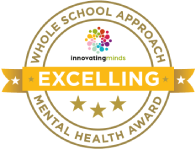Curriculum

Our curriculum is designed to create well-rounded children, so we devote 50% of our curriculum to the core subjects of maths, English, science, and information technology, but all our children also have weekly lessons in drama, music, dance, art and design, history, geography, French, Spanish, ethics, physical education/games, and Latin in year 6.
In addition to the academic curriculum, we offer a range of extracurricular activities, including a dance club, choir, orchestra, a range of sports, a vets club, board games, yoga, cookery, jam-coding, keep calm and create, and outdoor pursuit holidays.
This broad and diverse curriculum is enabled by structure and routines, clear expectations, and homework is set every night. By creating a happy, safe, and inclusive environment, our children demonstrate high levels of self-confidence, self-awareness, and resilience, which will stand them in good stead for the next stage in their education. Pupils of all ages respond to challenges with enthusiasm and determination without fear of failure.
To ensure that children are making the progress we expect, they are assessed by their teachers regularly throughout the year and externally by GL Assessment. Parents are kept updated on their child’s progress via written reports, parent-teacher evenings and our annual open evening. However, we know queries can occur at any time, so all our staff are happy to see parents immediately a problem or question presents itself.
A Coherent and Relevant Curriculum to Prepare Our Pupils for the Future
A coherent curriculum follows a logical progression, and our teachers pay close attention to the order in which knowledge is introduced and revisited.
Our curriculum is carefully mapped from Reception class to year 6 and each element is sequenced to ensure children continue to build on and develop their existing knowledge across every subject as they progress through the school. This helps them to build a clear picture of what may seem like disconnected pieces of knowledge over a period of time.
We know that everyone’s working memory is limited so we make sure that our curriculum builds on prior learning and allows children to accumulate new knowledge in small stages, consolidating understanding at one stage before moving on to the next.
Our teachers understand how important memory retention is for learning and understand the different factors that can influence this such as attention, motivation and repetition. They are able to use their extensive experience to improve learning outcomes for our children.
Strategies for Effective Learning
The development of different strategies for effective learning is important for promoting understanding, improving retention and enhancing our pupils’ problem-solving abilities, all of which are essential to success in education and beyond. Implementing these different strategies can make the learning process more effective and also more enjoyable.
The ongoing training of our teaching staff is focused on developing and incorporating different techniques to support children, leading to more excellent academic and future professional success.





